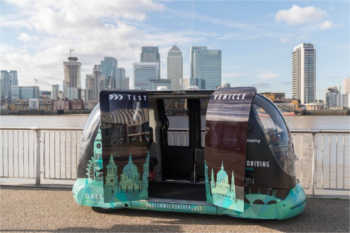Early results from one of the world's first attempts to explore human interaction with driverless cars, which took place in Greenwich, demonstrate support with underlying ambiguity.
Public reactions indicate 78% support for the idea of driverless vehicles on urban streets, 'provided they are safe and resistant to cyber attack'.

A driverless pod used in the GATEway
Further research found that 43%, from a sample size of 925, felt positive towards the concept of driverless vehicles but 46% were undecided and cited key concerns about cyber security (44%) and road safety (51%).
The public was invited to test prototype vehicles and services through a number of research streams including:
- simulation trials
- observations of pedestrian behavioural interactions with driverless vehicles
- automated grocery delivery trials
- a public shuttle service which offered a hop-on hop-off service at the Greenwich Peninsula.
More than 31,000 members of the public engaged with the GATEway Projec research, which was conducted by TRL (the UK’s Transport Research Laboratory) the University of Greenwich, Commonplace and the Royal College of Art.
The project was jointly funded by government and industry and focused on people, rather than technology.
It is thought to be the first scheme to invite the public to experience prototype technologies in a real-world settings, giving researchers the option to gain insight into implementing new forms of transport into complex real-world environments.
Richard Cuerden, academy director, TRL, commented: 'This is just the beginning of the journey towards connected and autonomous vehicles. Thanks to the GATEway Project’s research, the UK is in a prime position to build upon the lessons learned and experienced gained in trialling a whole range of driverless vehicles in urban environments.
'We see driverless vehicles as a practical solution to delivering safe, clean, accessible and affordable mobility and we are proud to be part of creating our future transport system.'
The GATEway Project has helped advance partnerships with developers Westfield Sportscars, Fusion Processing, Heathrow, Gobotix and Oxbotica and a collaboration with Ocado Technology.
It also paves the way for the Smart Mobility Living Lab (SMLL) - which will be based Royal Borough of Greenwich and nearby Queen Elizabeth Olympic Park in Stratford - a £19m test bed to benchmark connected and autonomous vehicles (CAV) in a complex and urban environment.
Register now for full access
Register just once to get unrestricted, real-time coverage of the issues and challenges facing UK transport and highways engineers.
Full website content includes the latest news, exclusive commentary from leading industry figures and detailed topical analysis of the highways, transportation, environment and place-shaping sectors.
Use the link below to register your details for full, free access.
Already a registered? Login